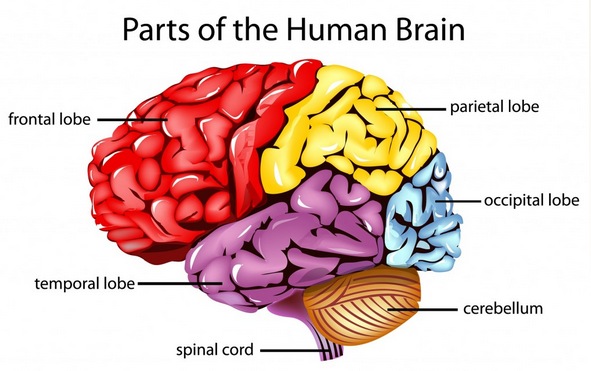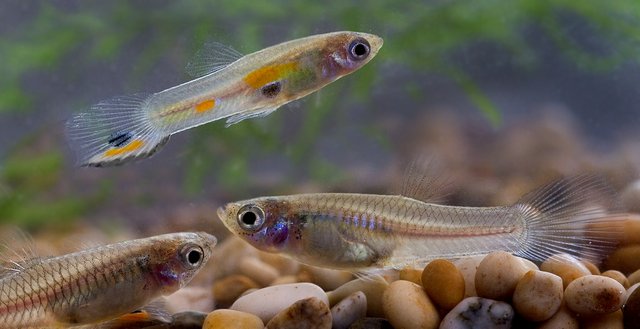Hello Steemians,
I know that almost every human being in this world would love to have that powerful brain, that remarkable intellectual ability, that unprecedented smartness and so on. The truth is that, it all sounds amazing and fantastic, but what most people don't understand is that there's a price, there's a trade off, there's a cost.
The brain is a very powerful part of our body, and is very energy consuming. Just the same way it is with our physical activities, the more we work, the more we need food to sustain us. A bigger brain, with all its powerful connectivity, abstract thinking, mathematical abilities and so on, also requires lots of energy to sustain it.
Hence, a smaller brain requires less energy than a bigger brain, simply because the smaller brain is less powerful and performs less activities than the bigger brains. Thus, the energy that these bigger brains use, must be compensated for one way or another, and that's where the problem is.
Have you ever noticed that most of the geniuses that made a mark in this world, suffered from mental disorders, such as Autism Spectrum disorder (ASD), Bipolar disorder, Attention Deficit Hyper-reactivity Disorder (ADHD) and so on. If you didn't know, then this post is for you. I'm sure that you've heard of these famous geniuses attempting suicide, going mad or experiencing serious depression etc.
In this post, I'm going to discuss with you famous historical figures that suffered from serious mental problems. And trust me, you would be surprised. So guys, bigger brains come at a cost. I would be dividing this post into two parts, because I can't possibly cover all that I need to tell you guys in one post. I would be discussing 10 historical figures with us that suffered from a mental disorder. We would continue from where I stop this time, next time. So let's go guys!

The Human Brain. Source: Wikimedia Commons. Author: ErMED14. CC-BY-SA-4.0 Licensed
The human brain is the organ that stands at the center of the human nervous system. It collaborates with the spinal cord to make up what we call the central nervous system. The brain has different parts, which include the cerebrum, there is also the brainstem and lastly the cerebellum. The brain controls almost all the activities of the body, from coordination, to processing, to integrating all the information that it receives from the various sense organs and then sends instructions to the rest of the body.
The brain is protected by some bones of the head called skullbones. The largest part of the human brain is the cerebrum. The cerebrum is divided into 2 hemispheres called cerebral hemispheres. The outer layer of the cerebral hemispheres contain grey matter called cerebral cortex, which covers the white matter at the core. These cerebral hemispheres are divided into four lobes each- frontal, temporal, parietal and lastly occipital lobes. Frontal lobe is related with some functions which incude planning, abstract thought, self control and reasoning. The occipital lobe is very well associated with visions.
Each lobe is associated with some functions, which include sensory (senses), motor (voluntary actions), and association (connecting areas within the hemispheres). Hence, the cerebral hemispheres invariably control abstract thinking, planning, memory etc.
Researchers have associated the cerebral cortex (grey matter), which is the larger part of the cerebral hemispheres with increased intellectual abilities. As a result, people with bigger brains have been found to have larger cerebral cortex area, while those people with smaller brains have been found to have smaller cerebral cortex.
The brain makes up only 2% of the total body mass in humans. But guess what?, the human brain uses up 20% of our energy demand. This 20% is for the average or smaller brains, bigger brains consume far more than 20% of our energy demand. So you see guys, the brain is a very energetically costly organ. Bigger brains come at a cost to other parts of our body. Some studies have suggested that consuming meat could have contributed to making people smart, simply because of the high energy it provides humans to support bigger brains.
I'm going to be providing us with an experimental evidence proving that bigger brains come at a cost to the development of gut and the number of offspring produced during reproduction
For the experiment, the researchers used guppies
The guppy (Poecilia reticulata), also known as millionfish and rainbow fish,[2] is one of the world's most widely distributed tropical fish, and one of the most popular freshwater aquarium fish species. It is a member of the family Poeciliidae and, like almost all American members of the family, is live-bearing.[3] Guppies, whose natural range is in northeast South America, were introduced to many habitats and are now found all over the world. They are highly adaptable and thrive in many different environmental and ecological conditions.[4] Male guppies, which are smaller than females, have ornamental caudal and dorsal fins, while females are duller in colour. Source
The researchers used guppies with bigger and smaller brains. The guppies with bigger brain sizes had a 9% bigger brain size than the guppies with smaller brains. Various tests were performed on them based on numerical learning

The Guppy. Source: Wikimedia Commons. Author: Per Harald Olsen. CC-BY-3.0 Licensed
It was found that female guppies with bigger brains performed far better than female guppies with smaller brain sizes, but male guppies showed no difference between those with bigger brains and those with smaller brains.
The researchers found that the difference between the male and female guppies cognitive abilities may have been as a result of the fact that the female guppies have been more active and creative when they gathered food. This creativity and activity that the female guppies showed towards food gathering may have been the reason for the gender advantage in the numerical learning tests.
The research found that guppies with bigger brains produced offspring with guts 20% smaller. Which proves that bigger brains come at a cost. The enormous amount of energy required by the bigger brains of the guppies, affected the development of the guts in their offspring, as there wasn't enough energy left for proper gut development.
The researchers also found that guppies with bigger brains produced 19% less offspring than the guppies with smaller brains.
As a result of the high energy demanded to support the bigger brains of these guppies, there wasn't enough energy to produce larger number of offspring, hence they produce 19% less offspring. You can see that bigger brains come at a cost.
Now let's relate this to humans
Mental and Immunological diseases associated with bigger brains in humans
As I mentioned above, people with bigger brains have so many advantages in so many fields. These advantages they enjoy come at a cost; as a result, they suffer from various immunological and mental diseases such as bipolar disorder, ADHD, ASD, depression, asthma, immune disorders and allergies etc.
.jpeg)
Extremely sad lady with Bipolar disorder. Source: Pexels ( CCO ) Licensed
Bipolar disorder
This disorder can also be called manic-depressive illness. It is associated with eccentric (unusual) shifts in mood, activities, and energy of the patient. There are different types of bipolar disorder. They all have to do with different levels of mood changes. The moods usually range from excessive excitement, to sadness, to hopelessness, to depression.
ADHD
Meaning Attention-deficit/ hyper-reactivity disorder. This is a brain disorder associated with inattention, and extreme levels of activities that affect the patients development and overall functioning. These individuals lack persistence, have a hard time focusing, show restlessness and act without properly thinking things through, hence they make hasty decisions.
ASD
Autism Spectrum Disorder is a disorder associated with unusual communication and behavior. Generally, this disorder is noticed before a child turns three years of age. People suffering from this disorder have difficulty in communication and socializing with other people.
They show interest in only very few things and show repetitive behaviors. ADS is no respecter of any human race, economic group, or ethnic group, it affects all. Patients may suffer from this disease throughout their lives. Mostly, the treatments can only improve the individuals functioning ability.
Research have found that people with bigger brains have higher propensities for mental overexcitabilities and excessive reaction (hyper-reactivity). On one hand, the excessive reactions, mental disorders (Bipolar, ADHD,ASD etc.), give these individuals high level of awareness, helps them become creative, as well as help them do amazing artistic work. All these disorders found in individuals with bigger brains, generally increase cognitive abilities and broaden their capacity to understand their surrounding.
Unfortunately, they have their advantages and disadvantages. For instance, hyper-reactivity may lead to poor mental health and depression, yet higher levels of understanding. It is seen in people with remarkable verbal intelligence. They always have that instant reaction. There's nothing you say to them that they won't have an immediate response to.

Extreme psychological response in Attention Deficit Hyper-reactivity Disorder. Source: Pxhere Public domain ( CCO ) Licensed
Also, high levels of psychological responses may affect immunity. It has been found that individuals with overexcitabilities may have reactions to harmless stimuli such as a sound or clothing tag. This may result to stress and unrest, which then leads to immune response.
Hence, the body thinks that it is in danger, careless of whether or not that is true. The body then responds physiologically by releasing a stream of hormones, signaling molecules etc. These unnecessary physiological response may affect the brain and body, thereby causing malfunctioning of the immune system; which may then lead to allergies, asthma and some other immune diseases. Research has actually confirmed the relationship between children given birth to with gifts and their high rate of asthma and allergies.
Now, here are some historical figures that suffered from mental disorders, directly indicating that they had bigger brains, since these are the diseases associated with people that have bigger brains.
Wolfgang Amadeus Mozart (Genius music writer)
Suffered from Tourette's syndrome
Charles Darwin (The theory of Evolution)
Suffered from Agoraphobia and panic disorder
Michelangelo (Remarkable writer)
Suffered from Obsessive-compulsive disorder and high-functioning autism
Isaac Newton (Laws of motion)
Suffered from Bipolar disorder
Napoleon Bonarparte (Powerful leader)
Suffered from Narcissistic personality disorder (NPD)
And that's it for now. In the second part of this article, we would be discussing in detail the psychology and behavior of these great figures I mentioned above and five more prominent figures; the relationship between their mental disorders and their accomplishments.
Thanks for reading. Till next time!!!
References
Image Sources
All images used here are from free sources and liable for commercial use
all licensed under the Creative Commons.

And Kurt Godel, the brilliant mathematician who starved to death with the believe that someone is out there to poison him after his wife was hospitalksed, was suffering from persecutory delusion.
Downvoting a post can decrease pending rewards and make it less visible. Common reasons:
Submit
Thanks for the contribution. These geniuses usually have one or more mental issues. That's the price they pay for their bigger brains. Thanks for reading through.
Downvoting a post can decrease pending rewards and make it less visible. Common reasons:
Submit
This got my attention
Wait, do bigger skull houses bigger brains?
Are people with bigger brain intelligent than those with smaller ones?
Can we say ancient great inventors like Michael Faraday, Isaac Newtons etc have bigger brains?
However, kindly adjust air-clinic tag..
Downvoting a post can decrease pending rewards and make it less visible. Common reasons:
Submit
Research has it that people with bigger brains tend to have better memories and retain their cognitive abilities at old age than people with smaller brains. There are suggestions that people with bigger heads have a higher tendency of been smart than people with smaller heads, because there's been recent relationship between cerebral cortex (grey matter) and increased cognitive abilities. Hence, people with bigger heads tend to have larger cerebral cortex and by direct connection should be more intelligent. But these are speculations for now.
And to your third question, oh yes, one can definitely conclude that those great names you mentioned have bigger brains. This is because no human being with a small brain can accomplish the great things they accomplished.
And finally thanks for the air-clinic correction. I would adjust that in a jiffy.
Thanks a lot for dropping by!!
Downvoting a post can decrease pending rewards and make it less visible. Common reasons:
Submit
Ohhh...thanks for the awesone answer
I wish you could present this article on the promo mentors and air-clinic discord servers
DM me if you are are not familiar with them and you're interested...
Downvoting a post can decrease pending rewards and make it less visible. Common reasons:
Submit
I'm interested. I would DM you. Thanks!!
Downvoting a post can decrease pending rewards and make it less visible. Common reasons:
Submit
First of all, let me congratulate you for a well written post. You seemed to be making outright conclusion that bigger brains are mostly associated with disorders, aside from the guppies experiment, are there any other experiments that have been done to prove this?
What level of correlation exists between the two phenomena as far as human/mammals are concerned? It would really be nice to have these facts.
Thanks
Downvoting a post can decrease pending rewards and make it less visible. Common reasons:
Submit
If you read the last words there, "it was still the second largest in the world". These are real proves that geniuses have larger brains.
And to your other question, primates have fewer offspring when compared to other lesser organisms. And humans have even fewer offspring. All these are proves that the bigger brains that humans have in general is the reason for our fewer offsprings. And geniuses, who are higher humans show mental disorders for the bigger brains they have in comparison to an average or smaller human brain.
Thanks for coming around!!
Downvoting a post can decrease pending rewards and make it less visible. Common reasons:
Submit
Extrapolating from guppies to humans? I would not do it. Also, I could probably find many more great figures of our history that were totally normal.
In short, be careful with generalizations!
Downvoting a post can decrease pending rewards and make it less visible. Common reasons:
Submit
Thanks @lemouth, I would be really careful with generalizations. I appreciate your comment. And a big thank you, for coming around!
Downvoting a post can decrease pending rewards and make it less visible. Common reasons:
Submit
The pleasure is for me :)
Downvoting a post can decrease pending rewards and make it less visible. Common reasons:
Submit
Hi @starrichie!
Your post was upvoted by utopian.io in cooperation with steemstem - supporting knowledge, innovation and technological advancement on the Steem Blockchain.
Contribute to Open Source with utopian.io
Learn how to contribute on our website and join the new open source economy.
Want to chat? Join the Utopian Community on Discord https://discord.gg/h52nFrV
Downvoting a post can decrease pending rewards and make it less visible. Common reasons:
Submit